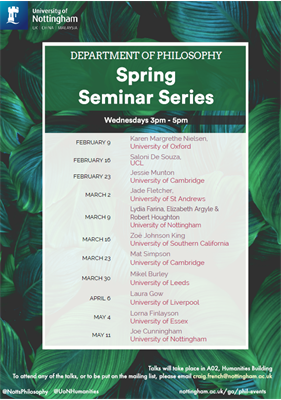
Philosophy spring seminar series poster
Join us for our spring research seminars of 2022. The speaker this week is Karen Margrethe Nielsen, University of Oxford.
Deliberation and Practical Truth in Aristotle
In this paper, I ask whether Aristotle’s account of practical reason in the Nicomachean Ethics can be squared with his analysis of future contingents in On Interpretation IX. On an influential reading, Aristotle in De Int IX refuses to assign definite truth values to statements about future particular states of affairs, those that occur ‘as the case may be’ or apo tuchês. Aristotle is thought to hold that extending the principle of bivalence to such statements leads to unacceptable consequences: specifically, it entails that everything that happens, happens of necessity (ex anankês) and that ‘nothing will happen as chance has it or by chance, since if by chance, not of necessity’ (De Int 18b16). On the standard analysis, Aristotle affirms that for any proposition p about particular events in the past, present or future, the disjunction ‘p or not p’ is true. But he is said to hold that each disjunct in statements concerning future particular states of affairs does not yet have a definite truth value, but rather acquires a definite truth value when the event it concerns either does or does not come to pass. On an alternative interpretation, Aristotle does not reject bivalence for such statements, but instead exposes a modal fallacy at the heart of the fatalist’s inference: her argument is invalid. If we adopt this alternative analysis, as I think we should, Aristotle has no reason to reject bivalence for future contingents, since Aristotle observes that the fatalist’s conclusion does not follow from her premises. Re-examining the argument of On Interpretation in light of his account of practical reason lends additional support to the alternative interpretation: Aristotle does not end up denying that thoughts about future contingents have definite truth-values.
All are welcome. The seminars will take place Wednesdays at 3pm-5pm in Humanities A02.
To sign up for our mailing list, please email the seminar convenor, Craig French: craig.french@nottingham.ac.uk